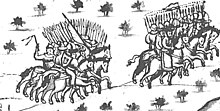Kütschüm Khan
Kütschüm Khan ( Tatar Күчүм , Küçüm ; Russian Кучум Kutschum ; also Küčüm; * before 1550, † around 1605 probably in Bukhara ) was the last Khan of the Sibir Khanate . Kütschüms cross-border raids and his attempt to spread Islam in his empire prompted the Russian tsar to send a Cossack army against him. Kütschüm is best known for his energetic resistance against the Russian invaders and is celebrated in numerous Tatar and Russian songs and legends.
Kütschüm was a descendant of the Uzbek Shaibanid dynasty , whose origins go back to Genghis Khan . In 1554 he fought for the throne of the Sibir Khanate against his opponents Yadegar and Bekbulat , both of whom were vassals of Russia. After Kütschüm had defeated Yadegar in 1563 and took over rule, he supported an attack on Perm in 1573 . This and other, smaller raids prompted the Russian tsar to support an invasion of the Sibir Khanate by the Cossacks.

In 1582 the khanate of Sibir was attacked by the Cossack ataman Yermak , who defeated the units of Kütschüms and took his capital Qaschliq . As a result, Kütschüm withdrew to the steppe , where he set up new units over the next few years. On August 6, 1584, in the dark of night, he unexpectedly attacked Yermak and killed him and most of his Cossack troops. The now dilapidated Qaschliq thus came back under the control of Kütschüms, who now tried to unite the various aristocratic factions within the Siberian Khanate. However, this project met with great resistance and after an unsuccessful murder attempt on his life, Kütschüm was finally forced to move his horde to the steppe south of the Irtysh . Here he tried to establish a new khanate that continued the war against the Russian governors.
In 1590 Kütschüm attacked the Tatars near Tobolsk , who had submitted to the Russians by paying tribute . In 1591 Kütschüm was intercepted on the Irtysh and two of his wives and his son Abdul-Khair were taken prisoner. With the partial completion of the Tara fortress in 1594, it became increasingly difficult for Kütschüm to evade Russian control. In 1597, Kütschüm, whose followers had been attacked on the upper Irtysh in 1595, asked the Tsar for negotiations, whereupon he offered him real estate in Russia in return for a surrender. In 1598 , Andrei Wojeikow intercepted a large number of other followers of the Khan in the vicinity of Lake Ubinskoye , and later he himself was taken prisoner on the Ob Kütschüm River . Although he managed to escape, the Russians killed two of his sons and took five other sons as well as eight wives and eleven daughters prisoner. Kütschüm replied to the Islamic clergyman who led the negotiations - describing himself as deaf, blind and without a livelihood - that he had not submitted so far and that he did not intend to do so . That was his last contact with the Russians. It is believed that he died in Bukhara around 1605 .
In 1620, Kütschüm's son Ischim Khan married a daughter of Khu Urluk , who then led his people to the Volga . Other descendants of Kütschüms stayed in the Grand Duchy of Moscow , where they eventually took the surname Sibirski . In 1591, Kütschüm's son, Abdul-Khair, was the first of the dynasty to convert to Christianity with his family and finally to become part of the Russian nobility. His son was still called Wassili Abulgairowitsch, but the name of his grandson Roman Wassiljewitsch could no longer be distinguished from that of a native Russian. In 1686 the tsar even decided that the ruling dynasties of Imeretia in the Caucasus should be included in the register of the Russian nobility together with the Tatar rulers of the Siberian and Kassimov Khanates . In 1661 a man was described as a descendant of Kütschüm who fought the Russians in Bashkiria .
See also
Individual evidence
- ↑ Michael Khodarkovsky: Russia's Steppe Frontier. Indiana University Press, 2002. ISBN 0253217709 . M1 Google Print, p. 265 .
- ^ Alton S. Donnelly: The Russian Conquest of Bashkiria. 1968. pp. 23, 127.
| predecessor | Office | successor |
|---|---|---|
| Murtaza | Khan of the Khanate of Sibir 1563–1598 |
- |
| personal data | |
|---|---|
| SURNAME | Kütschüm Khan |
| ALTERNATIVE NAMES | Küçüm (Crimean Tatar); Күчүм (Russian); Kuchum Khan |
| BRIEF DESCRIPTION | Khan of the Siberian Khanate |
| DATE OF BIRTH | 16th Century |
| DATE OF DEATH | around 1605 |